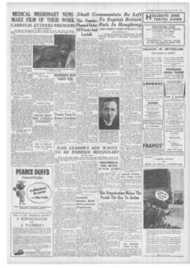Page 6, 18th June 1948
Page 6

Report an error
Noticed an error on this page?If you've noticed an error in this article please click here to report it.
Tags
Share
Related articles
Book Of The Month
Louis De Wohl
Two Views Of Rome
Novel About
St. Francis Turned To Fiction
THE MANY MANSIONS OF THE NOVEL
Answer to Question 33. By Christopher Sykes. (Collins, 8s. 6d.). Life Story. By Phyllis Bentley. (Gollancz, 10s. 6d.). The Living Wood. By Louis de Wohl. (Gollancz, 9s. 6d.). Harp ii7 the South. By Ruth Park. (Michael Joseph, 9s. 6d.). Quench the Moon. By Walter [slacken. (Macmillan. 10s. 6d.). The Walled City. By Elspeth Huxley. (Chatto and Winclus, 10s. 6d). The Lardners and The Laurelwoods. By Sheila Kaye-Smith. (Cassell, 9s. 6d.).
Res ievsed by W. J. IGOE " ALL manner of men " and women, all places, all times, social systems, even the ant-heap, in a dull way, are material for the novel ; it has so many mansions that, confronted with a list such as the one above, ranging the world and Yorkshire—the reviewer is tempted to cry his wares in the manner of the traditional mariner: " Any more for the Skylark ?" Mr. Sykes is the most footloose of his company; an urbane conversationalist in prose, tenuously reminiscent of Conrad, he brings a cultivated mind, a tolerance for human vagaries and a gracious style to a modern story. It opens in the House of Commons where one Kirkby, a former member of the Consular Service and demobilised officer, hears a russetfaced politician ask the Foreign Secretary Question 33; an Italian, Donna Isabella is broadcasting anti-British propaganda in Moscow; she had given our forces good service during the war; what lies between her unpopular change of front ? Kirkby had known the woman in Egypt and he sets out to tell us of the events that had led to her assuming the role of Red Lady Haw Haw. His whole life's story is unfolded. Ile is a member of the Northern squirearchy; he tells of his youthful love affair with Lady Caroline, daughter of Lord Bridlington and much of the novel is given over to an account of the life of one generation of this noble house. Bloody but unbowed the landed gentry raises its head again; an unfortunate class, in English fiction divided into the dull and the damned, it is to be feared that it does not emerge unscathed from this latest treatment. But these Bridlingtons emerge as persons; the vision of the novelist isolates each character; they are people, not ancient and fruity monuments. This is a most enjoyable book and one very much worth re-reading.
YORKSHIRE is the background of
Miss Bentley's story of the life of Hannah, matriarchial grandmother of a family of manufacturers, but even Yorkshire is kept in its place. Manslaughter, murder, elopement, bigamy, frustration, all varieties, drunkenness, decay and madness, are invoked with the dramatic force of a five-fingered exercise played upon a spinet by a centenarian spinster. Yet the story is absorbing and it is not until one has set the book aside that one realises the author has treated soulshattering subjects. Had the account been given by the nonogenarian one might appreciate the irony of this approach—after all, at ninety it must be difficult to be surprised by even human depravity—but the writer is a young man. Miss Bentley presents him with a stylish pen: his pianissimo is part of an interesting novel,
MISS Park and Mr. Macken take
us down the social scale, he to the peasant crofts of Connemara and she to the Irish in a Sydney slum. Her book will be very successful. She is not a reincarnation of Dickens, nor is she a heaven-sent genius as very distinguished types in the Sunday papers have claimed. She has written a nice little novel about good people living in a hideous industrial warren and because they are good, redeeming themselves. The people are what count in the book; there is no real theme, just a series of bright sketches. TIME and scene change for Mr. Louis de Wohl's excursion into one of the most difficult periods of historic fiction. Pre-Christian Britain baffles most novelists; we have no real link with the social values of the era. The Living Wood scores by the vivid sense of actuality the author conveys. St. Helena, British princess and mother of Constantine is his principal character, and her conversion, the events leading to it and its consequences are his theme. It is the drama of her discovery of the true cross which gives this book a general value, and although there are passages in it which are not for the squeamish, I think it is of particular interest to Catholics.
WALLED City and The Lard ners and the Laurelwoods take us to Africa, and the Far East and snuggly, domestically and in a nice middle-class way, home. The first concerns the development of four dissimilar characters, two members of the Colonial Service and their wives. It opens with a besieged garrison in the Far East being rallied by a somewhat pipsqueak Governor who is, ironically, being rallied himself by a very young subaltern. Then with the skill of a conjuror the novelist flicks the significant years leading to this event, before our eyes like playing cards. Careerism, materialism, idealism and human weakness; a new brash civilisation in conflict with the old and philosophical; these are the subjects this intelligent writer has chosen. She does them justice. One can say little of Miss Sheila Kaye-Smith's novel except recommend it. The small transactions of family life and their immense drama and the irony of the views brought to bear upon them by children who have grown up are formed into a charming story and an understanding book.
The Forerunner (Teresa Lloyd: Sands) tells the story of St. John Baptist in fine poetic form.
blog comments powered by Disqus









